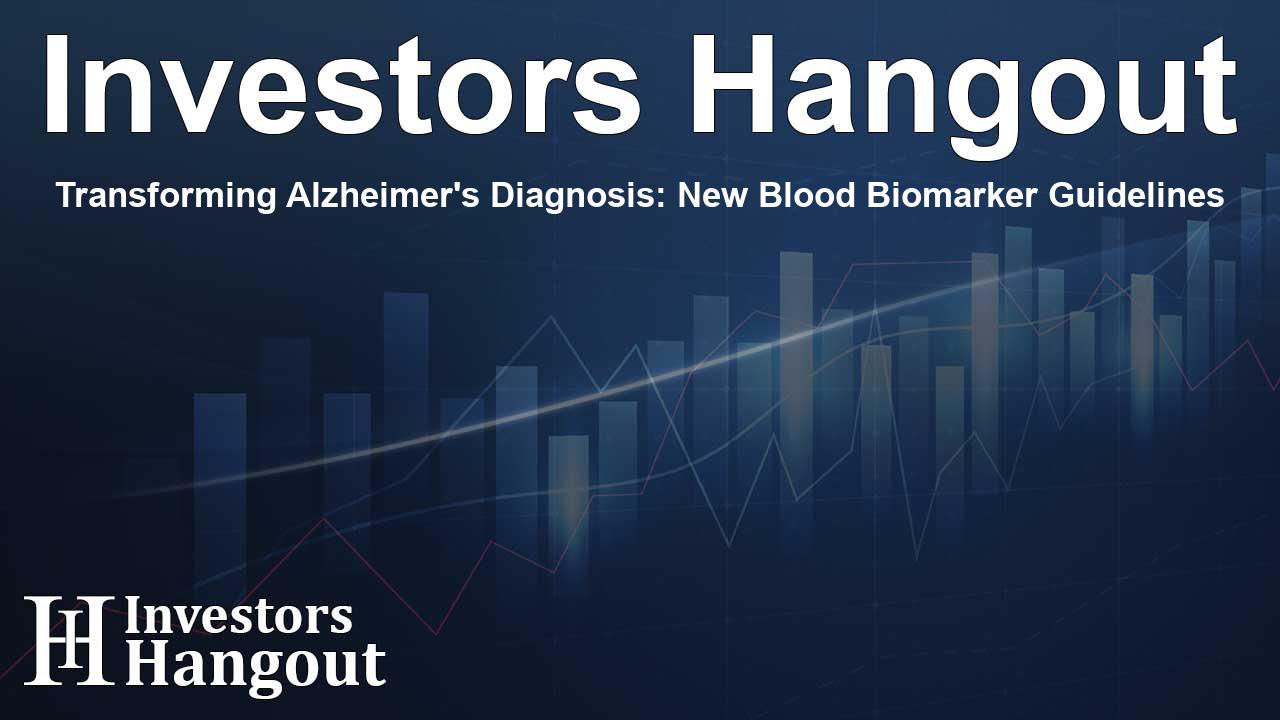Transforming Alzheimer's Diagnosis: New Blood Biomarker Guidelines

Introduction to New Alzheimer's Guidelines
At the forefront of Alzheimer's research, the Alzheimer's Association has recently introduced a pioneering set of clinical practice guidelines. These guidelines aim to improve the diagnosis, treatment, and care of Alzheimer’s disease and related dementias. They emphasize the utilization of blood-based biomarker tests by healthcare specialists to evaluate Alzheimer's disease pathology in those experiencing cognitive impairment.
Understanding Blood-Based Biomarkers
Blood-based biomarkers are evolving as a vital tool in the early detection of Alzheimer's disease. The new guidelines advocate for these tests to aid specialists in diagnosing Alzheimer's with greater accuracy and efficiency. With a structured and evidence-based approach, the Alzheimer's Association equips clinicians with the necessary resources to identify this disease at its earliest stages, ensuring timely intervention and effective treatment.
The ALZPro Initiative
The guidelines form part of the broader ALZPro initiative, which serves as an essential platform for healthcare professionals. This hub centralizes resources, support, and information relevant to professionals working with dementia patients, aimed at fostering collaboration and enhancing practice standards.
Significant Recommendations
The newly released guidelines provide several key recommendations, specifically designed for specialists in memory disorders:
- Blood biomarker tests demonstrating ?90% sensitivity and ?75% specificity can be employed as triaging tools. A negative result can effectively rule out Alzheimer's pathology, although further confirmation via cerebral spinal fluid (CSF) tests or amyloid PET imaging is encouraged for positive results.
- High-sensitivity BBM tests (?90%) can replace PET amyloid imaging for confirming Alzheimer's diagnoses.
It is crucial to note, however, that the accuracy of these tests can vary significantly. Many available blood biomarker tests might not meet the outlined accuracy thresholds, emphasizing the importance of clinician diligence.
The Role of Clinicians
Healthcare providers play a central role in applying these guidelines effectively. As stated by experts from the Alzheimer’s Association, the responsible application of blood biomarker tests ensures that patients receive the most accurate diagnostics while avoiding unnecessary or inappropriate use of these tests. Comprehensive clinical evaluations remain indispensable in this process.
Advancements in Alzheimer's Care
The advent of blood-based biomarkers signals a major shift in Alzheimer’s care. Compared to traditional diagnostic methods such as PET scans and CSF analysis, blood tests tend to be less expensive and more readily available. The guidelines reinforce that while these tests are beneficial, they are not substitutes for thorough clinical assessments by healthcare professionals.
The GRADE Methodology
These clinical practice guidelines utilize the Grading of Recommendations Assessment, Development and Evaluation (GRADE) methodology, establishing a transparent and evidence-based process for evaluating the reliability of evidence. This methodology enhances the credibility and applicability of the guidelines, ensuring that recommendations are backed by substantial research.
Engagement and Input
A dedicated panel of 11 clinicians, comprising neurologists, geriatricians, nurse practitioners, and other specialists, has developed these guidelines. Their recommendations were shaped by a systematic review and inputs from the Alzheimer’s Association’s Early-Stage Advisory Group, which includes individuals living with early-stage Alzheimer's disease.
The Biomarkers Under Review
The focus of the current guidelines encompasses specific blood-based biomarkers such as plasma phosphorylated-tau (p-tau) and amyloid-beta (A?). The analysis incorporates various metrics indicative of Alzheimer's disease pathology. The panel prudently opted for a performance-based approach, avoiding endorsements of particular tests to eliminate bias and ensuring robust recommendations for clinicians.
Future Directions
The new guidelines lay the groundwork for subsequent initiatives, addressing cognitive assessment tools and the clinical implementation of staging criteria for Alzheimer’s treatment in the upcoming years. These efforts signify a commitment to enhancing the standard of care for Alzheimer's patients and ensuring equitable access to diagnostic technologies.
Concluding Remarks
This pioneering clinical practice guideline is a significant development in Alzheimer's disease diagnostics, reflecting a commitment to improving care through structured and evidence-based practices. As the field continues to evolve, the Alzheimer’s Association is dedicated to advancing these guidelines and will regularly update them in line with new findings.
Frequently Asked Questions
What are the new guidelines about?
The new guidelines focus on the use of blood-based biomarker tests for diagnosing Alzheimer's disease, helping specialists make informed decisions in patient care.
Why are blood-based biomarkers important?
Blood-based biomarkers provide a less invasive, cost-effective method for assessing Alzheimer’s pathology, leading to quicker and more accurate diagnoses.
Who does the guideline primarily target?
The guidelines are aimed at healthcare specialists involved in the diagnosis and management of cognitive impairment in specialized care settings.
What is the GRADE methodology?
The GRADE methodology offers a structured approach to evaluating evidence, adding credibility to the clinical practice guidelines by ensuring recommendations are based on solid research.
What other upcoming guidelines should we expect?
The Alzheimer’s Association plans to introduce more guidelines addressing cognitive assessment tools, clinical staging criteria implementation, and prevention strategies in the coming years.
About The Author
Contact Owen Jenkins privately here. Or send an email with ATTN: Owen Jenkins as the subject to contact@investorshangout.com.
About Investors Hangout
Investors Hangout is a leading online stock forum for financial discussion and learning, offering a wide range of free tools and resources. It draws in traders of all levels, who exchange market knowledge, investigate trading tactics, and keep an eye on industry developments in real time. Featuring financial articles, stock message boards, quotes, charts, company profiles, and live news updates. Through cooperative learning and a wealth of informational resources, it helps users from novices creating their first portfolios to experts honing their techniques. Join Investors Hangout today: https://investorshangout.com/
The content of this article is based on factual, publicly available information and does not represent legal, financial, or investment advice. Investors Hangout does not offer financial advice, and the author is not a licensed financial advisor. Consult a qualified advisor before making any financial or investment decisions based on this article. This article should not be considered advice to purchase, sell, or hold any securities or other investments. If any of the material provided here is inaccurate, please contact us for corrections.
